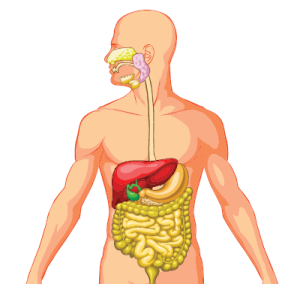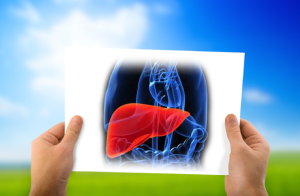What Roles Does Liver Play in Our Body? Part2
2. DIGESTION AND HORMONE
When we consume food, it goes through a system of digestive organs and processes to be digested. Digestive system consists of digestive organs and accessory organs. Digestive organs include mouth, throat, esophagus, stomach, small intestine and large intestine. Accessory organs include teeth, tongue, salivary gland, liver, gall bladder, and pancreas.

Image Retrieved from : Nutridom Booklet, 4
Although classified as accessory organs, Liver plays important role in digestion. Without liver, body would die quickly from lack of energy and nutrients. Major functions of liver are regulated by a liver cell Hapatocyte, which makes up 70-85% of the liver mass.
Bile
Hepatocyte, a liver cell, produces “bile,” a fluid that aids with digestion of lipids in the small intestine. Bile is stored in gall bladder, another accessory organ. When food containing fat reaches small intestine, bile is released, breaking down fat into smaller pieces and making it easier for body to digest.
Metabolism
Once carbohydrate, fat and protein are digested, they enter bloodstream in forms of glucose, fatty acid and amino acids. Hepatocyte regulates metabolism by absorbing these from blood in hepatic portal vein.
At liver, fatty acids are metabolized and used to produce energy. Few amino acids from dietary proteins are broken down into ammonia and urea for excretion, and rest are used to produce energy.
In particular, Hepatocyte regulates glucose metabolism. It would absorb excess glucose from vein, and when glucose level is too low, releases glucose into bloodstream.
Liver is also actively involved in regulation of hormones, through both production and breakdown. The most famous example would be Insulin-like Growth Factor (IGF-1). It is a hormone that plays important role in childhood growth.
Primarily produced by liver, IGF-1 promotes growth on almost every cell in body, including skeletal muscle, bone, and nerve cells. Liver is also a major production site for Angiotensinogen, which stimulates angiotensin to maintain blood pressure.
In addition, Liver produces Thrombopoietin which stimulates bone marrow to produce more platelets, and Hepcidin which regulates iron level in body.
We hope this information will help you to understand ‘Liver’
We wish you to be healthy!


Leave a Comment
You must be logged in to post a comment.